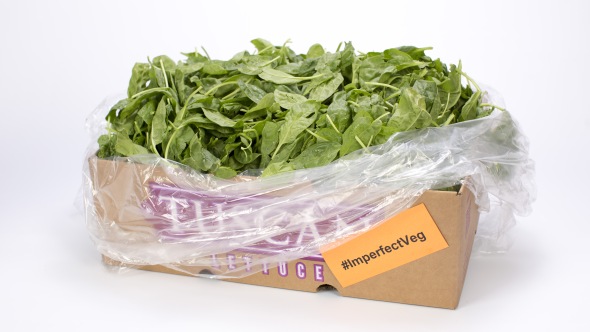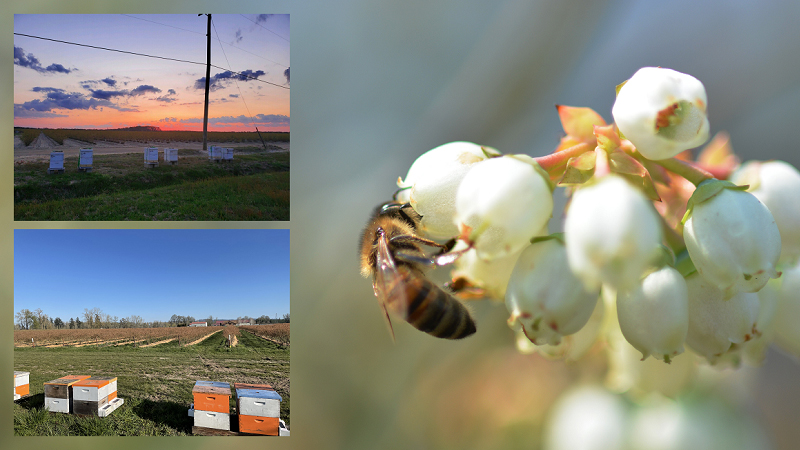Imperfect Produce Scores A Second Chance

Second-cut spinach finds a home with IDP and saves money for Church Brothers.
Photo credit: Church Brothers
While the drought in the West taxes growers in California, many are being pushed to create new ways of managing limited resources while maintaining profitability. Whether it’s more precise management of water, fertilizers, or any other high-value input, growers are stepping up to the conservation challenge to stay in the game.
An example of such innovation is the program Imperfectly Delicious Produce (IDP), developed by Compass Group, which owns Bon Appetit Management. The program, launched in 2014, was born out of the need to combat food and water waste. IDP has created partnerships with growers across the country who supply the company their blemished, or otherwise imperfect produce.
After IDP acquires produce from growers, it works with distributors who channel the produce to cafes at schools, businesses, and other catering facilities. The chefs at Bon Appetit then find ways to incorporate the produce into culinary offerings.
The program reportedly has saved approximately 220,000 pounds of produce, and is currently operating in nine states.
“The growers we work with said they never had a viable market for non-grade A products,” says Christine Seitz, vice president of Compass Group’s Culinary Business Excellence. “Second-grade produce doesn’t always fit into what they’re doing because it doesn’t meet the artificial standards of attractiveness.”
A New Way To Grade Produce
While most produce not considered quality enough to be “No. 1” is categorized as “No. 2” by USDA standards, Seitz says IDP’s grading standards for blemished produce are in a category of their own.
“It’s important to understand IDP is a new grading of produce that Compass Group has created. While the produce is imperfect, it still has to be intact, and of good quality. It just is not meeting the artificial standard of attractiveness,” she says.
Examples of imperfections include variations in size, color, and shape that prevent it from being considered for the No. 1 category.
According to Seitz, broccoli florets and second-cut spinach are IDP’s primary categories, and the goal of the program is to source produce from growers in a way that is most economical for the grower.
Working With Church Brothers
One California operation tackling food waste head-on with IDP is Salinas-based Church Brothers. The operation partnered with IDP nearly two years ago as a way to do more with less, according to Josh Ruiz, Church Brothers’ innovation manager.
The farm grows cauliflower, broccoli, green onions, Romaine lettuce, and other leafy greens and specialty crops. Ruiz says that Compass Group initially approached the operation with the idea, and Church Brothers saw the potential immediately.
“Ultimately, both the production team and the growers are always looking for ways to increase our yield. The more boxes we have, the better off we’re all going to be. Where we’re at, water and land are resources that are limited at this point,” Ruiz says.
Prior to joining forces with IDP, Ruiz says that a lot of the waste, or second-grade produce would go to feed lots. Currently, Church Brothers is supplying IDP with Swiss chard, baby greens, cauliflower, broccoli bits, Romaine leaves, and second-cut spinach.
The second-cut spinach is grown by using the same root system as the initial cutting, and it only takes 14 to 21 days to grow the crop to maturity compared to the 45 to 65 days it takes to grow the first crop.
Ultimately, the difference between the first and second crop is that the second crop will see 10% of the harvested leaves outside of the standard specification, meaning they are less than 3 inches in length, and may have a cosmetic defect.
“We have to water [the first cut] two to three times and apply fertilizer, etc. With the second cut, instead of watering two to three times, we only water it once,” Ruiz says. “We don’t need to add fertilizer. It’s saving a lot of water and inputs.”
Looking ahead, Ruiz says he hopes Church Brothers will continue to grow this category. “Our job as modern day farmers is to get more out of less. We’re excited to expand.”









